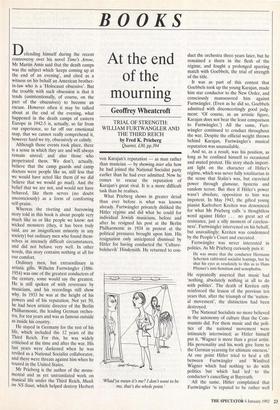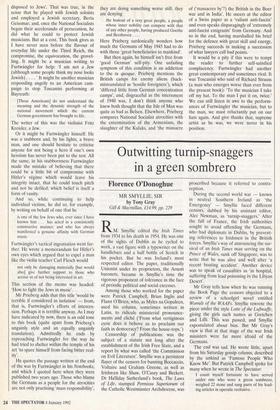BOOKS
At the end of the mourning
Geoffrey Wheatcroft
TRIAL OF STRENGTH: WILLIAM FURTWANGLER AND THE THIRD REICH by Fred K. Prieberg Quartet, f30, pp.394 Defending himself during the recent controversy over his novel Time's Arrow, Mr Martin Amis said that the death camps was the subject which 'keeps coming up at the end of an evening', and cited as a witness on his behalf an American brother- in-law who is a 'Holocaust obsessive'. But the trouble with such obsession is that it tends (unintentionally, of course, on the part of the obsessives) to become an excuse. However often it may be talked about at the end of the evening, what happened in the death camps of eastern Europe in 1942-5 is, actually, so far from our experience, so far off our emotional map, that we cannot really comprehend it, however hard we try, obsessively or calmly.
Although those events took place, there is a sense in which they are and will always remain unreal; and also those who perpetrated them. We don't, actually, believe that the camp guards and camp doctors were people like us, still less that we would have acted like them (if we did believe that we would go mad). And the belief that we are not, and would not have behaved, like them serves (no doubt unconsciously) as a form of comforting self-praise.
Whereas the riveting and harrowing story told in this book is about people very much like us or like people we know: not wicked monsters (they, it has been truly said, are an insignificant minority in any society) but ordinary men who found them- selves in intensely difficult circumstances, and did not behave very well. In other words, this story contains nothing at all for our comfort.
Ordinary men, but extraordinary in artistic gifts. Wilhelm Furtwangler (1886- 1954) was one of the greatest conductors of the century, some would say the greatest. He is still spoken of with reverence by musicians, and his recordings still show why. In 1933 he was at the height of his powers and of his reputation. Not yet 50, he had been artistic director of the Berlin Philharmonic, the leading German orches- tra, for ten years and was as famous outside as inside his country.
He stayed in Germany for the rest of his life, which included the 12 years of the Third Reich. For this, he was widely criticised at the time and after the war. His last years were darkened when he was reviled as a National Socialist collaborator, and there were threats against him when he toured in the United States.
Mr Prieberg is the author of the monu- mental and as yet untranslated work on
musical life under the Third Reich, Musik im NS-Staat, which helped destroy Herbert von Karajan's reputation — as man rather than musician — by showing inter alia how he had joined the National Socialist party earlier than he had ever admitted. Now he comes to rescue the reputation of Karajan's great rival. It is a more difficult task than he realises.
What Prieberg shows in greater detail than ever before is what was known already. Furtwangler privately disliked the Hitler regime and did what he could for individual Jewish musicians, before and after he resigned his post at the Berlin Philharmonic in 1934 in protest at the political pressures brought upon him. His resignation only anticipated dismissal by Hitler for having conducted the 'Culture- bolshevik' Hindemith. He returned to con- `Whad'ya mean it's me? I don't want to be me, that's the whole point.' duct the orchestra three years later, but he remained a thorn in the flesh of the regime, and fought a prolonged sparring match with Goebbels, the trial of strength of the title.
It was as part of this contest that Goebbels took up the young Karajan, made him star conductor to the New Order, and consciously manoeuvred him against Furtwangler. (Even as he did so, Goebbels admitted with disconcertingly good judg- ment: 'Of course, as an artistic figure, Karajan does not bear the least comparison to Furtwangler.') All the same, Furt- wangler continued to conduct throughout the war. Despite the official weight thrown behind Karajan, Furtwangler's musical reputation was unassailable.
And so, as a result, was his position, as long as he confined himself to occasional and muted protest. His story sheds import- ant light on the character of Hitler's regime, which was never fully totalitarian in the sense that Stalin's was, but exercised power through glamour, hysteria and random terror. But then if Hitler's power wasn't absolute, opposition to him was impotent. In May 1943, the gifted young pianist Karlrobert Kreiten was denounced for what Mr Prieberg calls 'a thoughtless word against Hitler . . . no great act of resistance, just a silly moment of careless- ness'. Furtwangler intervened on his behalf, but unavailingly; Kreiten was condemned by the People's Court and executed.
Furtwangler was never interested in politics. As Mr Prieberg curiously puts it:
He was aware that the conductor Hermann Schcrnen cultivated socialist leanings, but he shut his eyes as resolutely to this as to Hans Pfitzner's anti-Semitism and xenophobia.
He repeatedly asserted that music had 'nothing, absolutely nothing at all to do with politics'. The death of Kreiten only reinforced the lesson of the previous ten years that, after the triumph of the 'nation- al movement', the distinction had been destroyed.
The National Socialists no more believed in the autonomy of culture than the Com- munists did. For them music and the poli- tics of the national movement were intimately intertwined; as Hitler himself put it, 'Wagner is more than a great artist. His personality and his work give form to the German yearning for ultimate oneness.' At one point Hitler tried to heal a rift between Furtwangler and Winifred Wagner which had nothing to do with politics but which had led to the conductor's cancelling at Bayreuth.
All the same, Hitler complained that Furtwangler 'is reputed to be rather well disposed to Jews'. That was true, in the sense that he played with Jewish soloists and employed a Jewish secretary, Berta Geissmar; and, once the National Socialists began their accelerando of persecution, he did what he could to protect Jewish musicians. But at a cost. This book gives as I have never seen before the flavour of everyday life under the Third Reich, the compromise, the equivocation, the grovel- ling. It might be a musician writing to Furtwangler for help: 'I am not a .Jew (although some people think my nose looks Jewish) .... ' It might be another musician responding angrily to an American cam- paign to stop Toscanini performing at Bayreuth:
[Those Americans] do not understand the meaning and the dynamic strength of the national movement which the current German government has brought to life.
The writer of this was the violinist Fritz Kreisler, a Jew.
Or it might be Furtwangler himself. He was a stubborn and, by his lights, a brave man, and one should hesitate to criticise anyone for not being a hero if one's own heroism has never been put to the test. All the same, in his stubbornness Furtwangler made the mistake of believing that there could be a little bit of compromise with Hitler's regime which would leave his integrity intact, that he could touch pitch and not be defiled; which belief is itself a form of vanity.
And so, while continuing to help individual victims, he did so, for example, by writing on behalf of one that he
is one of the few Jews who, ever since I have known him . .. has acted in a consistently constructive manner, and who has always manifested a genuine affinity with German music.
Furtwiingler's tactical ingratiation went fur- ther. He wrote a memorandum for Hitler's own eyes which argued that to expel a man like the violin teacher Carl Flesch would
not only be damaging materially [but would also] give further support to those who accuse us of not being interested in art.
This section of the memo was headed: `How to fight the Jews in music'.
Mr Prieberg adds that this title 'would be terrible if considered in isolation' — from, that is, Furtwangler's efforts of interces- sion. Perhaps it is terrible anyway. As I may have indicated by now, there is an odd tone to this book (quite apart from Prieberg's ungainly style and an equally ungainly translation). Admittedly he ends by reproaching Furtwangler for the way he had tried to shelter within the temple of his art `to spare himself from facing bitter real- ity'.
He quotes the passage written at the end of the war by Furtwangler in his Notebooks, and which I quoted here when they were published two years ago. Those who blame the Germans as a people for the atrocities are not only practising 'mass responsibility',
they are doing something worse still: they are denying
the honour of a very great people, a people whose inner nobility can compete with that of any other people, having produced Goethe and Beethoven ....
Here Prieberg sardonically wonders how much the Germans of May 1945 had to do with those 'great beneficiaries to mankind'.
But then again, he himself isn't free from `good German' self-pity. One unfailing symptom of this condition is an addiction to the to quoque. Prieberg mentions the British camps for enemy aliens (back- mistranslated as 'hostile foreigners'), which `differed little from German concentration camps', and, disgraceful as the internment of 1940 was, I don't think anyone who knew both thought that the Isle of Man was quite as bad as Belsen. Elsewhere, Prieberg compares National Socialist atrocities with the extermination of the Armenians, the slaughter of the Kulaks, and 'the massacre
of (`massacres by'?) the British in the Boer war and in India'. He sneers at the editor of a Swiss paper as a 'valiant anti-fascist' and even speaks disparagingly of 'extremely anti-fascist emigrants' from Germany. And so in the end, having marshalled his brief for the defence with great skill and energy, Prieberg succeeds in making a succession of what lawyers call bad points.
It would be a pity if this were to tempt the reader to further self-satisfied complacency. Furtwangler had another great contemporary and sometimes rival. It was Toscanini who said of Richard Strauss (a man who emerges worse than ever from the present book): `To the musician I take off my hat. To the man I put it on, twice.' We can still listen in awe to the perform- ances of Furtwangler the musician, but to the man, we must reluctantly put on our hats again. And give thanks that, supreme artist as he was, we were never in his position.











































 Previous page
Previous page